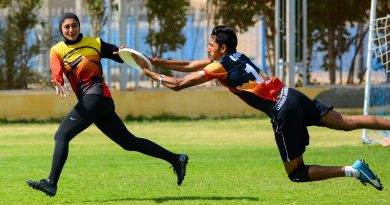In the Ruins of Foreign Occupation: The Iraq War
By: Salma Aboulwafa
@Salmaabouelwafa
The third episode of the Reporting History webinar, which explores major world-wide historical events from the perspective of journalists who were on the scene, last focused on the Iraq War and the US occupation as seen through the lens and reports of architect-cum-journalist Ghaith Abdul-Ahad.
The Iraq War, which this month marks its 19th anniversary, changed the course of history in the Middle East. It devastated a once rich and diverse nation, left hundreds of thousands dead in the wake of the US occupation and a near civil war, and opened the way for extremist groups to penetrate the region. Abdul-Ahad was curious about how his country had come to be occupied. His anger toward his regime and the foreign invasion pushed him to walk into the occupied presidential palace claiming to be a journalist to seek answers on his country’s future.
“I wanted to understand my country. I was living in this country for 29 years; I have never left Iraq. My whole life was shaped
by Saddam and his government and his regime. I wanted to know why he did what he did,” said Abdul-Ahad during the webinar.
Abdul-Ahad was asked about the sensitive side of journalism during conflict and violence where difficult choices must often be made.
As a war photojournalist, Abdul-Ahad would sometimes have to “wipe the blood of the lens” and carry on his duties as a jour-
nalist by showing the world what was happening in Iraq. He said that there was no need to choose between being a journalist and a compassionate human being; his actions were determined by the situations presented at the time.
“If you are in the middle of the road alone and there is a guy who needs help you should go and help this person, that’s your job as a human being. However, if there is an injured person and there are other people trying to help him, I could be another hand trying to patch the blood or I could do my own job and show the world that civilians were being bombed in their own city by an American helicopter,” Abdul-Ahad said.
The webinar, hosted by Khaled Ezzelarab, associate professor of practice at the Journalism and Mass Communications Department, touched on the issue of nationalism and working for foreign agencies.
During his coverage of the war, Abdul-Ahad had to assume multiple identities to easily navigate through the different social and religious sectors in Iraq which placed him at risk from opposing groups. Abdul-Ahad added that working as a journalist and for a foreign news organization put him at even further risk. “When you, the storyteller, become yourself a target, the
challenges become enormous,” said Abdul-Ahad.
Western media has always been a leading entity in shaping the conveyance of war and conflict. Wars in the twenty and twenty-first centuries, such as the ones in Iraq, have been promoted as necessary to implement democracy and remove dictatorial regimes. However, that has only been the case in non-Western countries.
“At the end of the day, yes, we should be condemning Russian aggression but why don’t we see this condemnation when it comes
to Israel, for example. Another point is the coverage of the refugee crisis that resulted from this [Ukrainian] war is very different
from the refugee crisis when the refugees were brown. So, there is much to be said about the lack of consistency in Western media,” Ezzelarab told The Caravan.
The current war on Ukraine is being condemned by Western media as a violation of human rights and Russia has been under constant attack by the media for breaking international law.
In the light of this war, many activists, journalists, and political scientists are pointing out the hypocrisy and double standards
of Western media for turning a blind eye on American-led wars in the Middle East.
“There is no recipe in the world that would allow an occupation to succeed,” said Abdul-Ahad when he talked about the unbalanced scale of the illegal American invasion and the collapsed dictatorial regime that left Iraq vulnerable to various factions.



